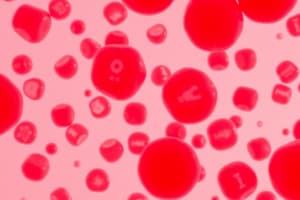Podcast
Questions and Answers
What is the primary cause of macrocytosis in megaloblastic anemias?
What is the primary cause of macrocytosis in megaloblastic anemias?
- Excessive production of white blood cells
- Increased red blood cell destruction
- Abnormal DNA metabolism due to vitamin B12 or folate deficiency (correct)
- Decreased iron availability
How does megaloblastosis affect red blood cell maturation?
How does megaloblastosis affect red blood cell maturation?
- It has no effect on the maturation process
- It speeds up the maturation process
- It only affects white blood cell maturation
- It retards the maturation process, resulting in immature large RBCs (correct)
Which of the following drugs can cause macrocytosis?
Which of the following drugs can cause macrocytosis?
- Aspirin
- Hydroxyurea (correct)
- Vitamin D
- Ibuprofen
What characterizes nonmegaloblastic anemias compared to megaloblastic anemias?
What characterizes nonmegaloblastic anemias compared to megaloblastic anemias?
What is a key difference in the production rates of RNA and DNA in macrocytic anemias?
What is a key difference in the production rates of RNA and DNA in macrocytic anemias?
Flashcards
Macrocytic anemia
Macrocytic anemia
A type of anemia characterized by large, immature red blood cells (RBCs) due to abnormal DNA synthesis.
Megaloblastic anemia
Megaloblastic anemia
Macrocytic anemias caused by vitamin B12 or folate deficiency, leading to disrupted DNA synthesis.
Megaloblastosis
Megaloblastosis
A condition where the rate of RNA and cytoplasm production in RBCs outpaces DNA production, resulting in large, immature cells.
Drug-induced macrocytic anemia
Drug-induced macrocytic anemia
Signup and view all the flashcards
B12/Folate deficiency and megaloblastic anemia
B12/Folate deficiency and megaloblastic anemia
Signup and view all the flashcards
Study Notes
Macrocytic Anemias
- Macrocytic anemias are categorized into megaloblastic and nonmegaloblastic types.
- Megaloblastic anemias are characterized by macrocytosis, a condition arising from abnormal DNA metabolism.
- This abnormal DNA metabolism is often due to vitamin B12 or folate deficiency.
- Other causes include various medications, including hydroxyurea, zidovudine, cytosine arabinoside, methotrexate, azathioprine, 6-mercaptopurine, and cladribine.
Megaloblastic Anemia Mechanisms
- In vitamin B12 or folate deficiency anemias, megaloblastosis occurs.
- This is caused by disturbed folic acid and vitamin B12 dependent nucleic acid synthesis within immature red blood cells.
- The rate of RNA and cytoplasm production surpasses DNA production during maturation.
- This retardation leads to the production of large, immature red blood cells (macrocytosis).
Studying That Suits You
Use AI to generate personalized quizzes and flashcards to suit your learning preferences.




